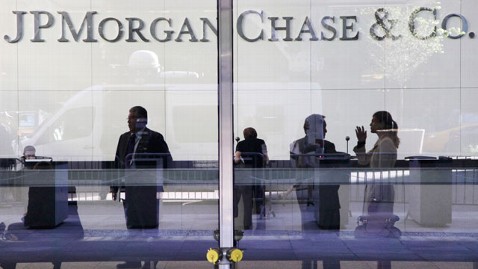Chase to Pay $100M for Card Fees

People stand in the lobby of JPMorgan Chase headquarters in New York, in this file photo.
Under a court settlement filed this week in San Francisco, JPMorgan Chase will pay $100 million to credit card holders who saw their minimum monthly payments hiked from 2 percent to 5 percent between 2008 and 2009.
A class-action lawsuit, filed three years ago, argued that the increase was improper, and that it violated commitments made by the bank to induce cardholders to switch their balances to Chase from other lenders.
Those commitments, says Howard Dvorkin, CPA, a founder of ConsolidatedCredit.org, included interest rates that were supposed to remain "fixed" until balances were paid in full. "They said come to us and we'll fix your interest rate for the life of the loan, until it's paid off," says Dvorkin.
In 2008 and 2009, however, the bank raised rates, triggering an increase in late payment penalties from hard-squeezed borrowers. Late payment also could trigger a penalty interest rate of 29.29 percent.
"Your promotional rate that got you to the bank, they didn't honor," says Dvorkin. "A client would go delinquent, and triggering penalty and late fees, and your interest rate could go to 30 percent. Do I think this was part of an evil master plan? No. Do I think it was aggressive? Yes. And now they're paying the penalty for it."
Chase's view, according to the proposed settlement, which still must be approved by a judge, was that raising payment minimums was "a reasonable and sensible response to unprecedented economic turmoil and impending regulatory changes"- meaning the credit card reform act of 2009.
The proposed settlement includes a complex allocation plan for divvying up the $100 million between members of the class. Class members get a flat payment of $25 plus a pro-rata share of the settlement fund (after legal fees and costs have been deducted). The plan gives $72 as a representative amount. "At the end of the day," says Dvorkin, "it's the lawyers who make the money."
A spokesperson for JPMorgan Chase, contacted by ABCNews.com, declined to comment on the settlement.
Darryl Dahlheimer, program director of LSS Financial Services, a provider of credit counseling advice, views the settlement as a warning to borrowers: most consumers, he says, have no concept how long it will take them to pay off a credit card balance if all they're paying is the monthly minimum. On LSS's website is a calculation tool called the Scrooge-O-Meter they can use to see the awful truth.
"Let's say you've got a $10,000 balance on your card," says Dahlheimer. "And say your interest rate is 18 percent. That's a realistic, non-teaser rate. If you pay the minimum of 2 percent or $200 a month, it'll take you 94 months"-upwards of 8 years to pay it off.
"If someone feels trapped by rising payments," he advises, "there's a whole industry called consumer credit counseling that has a product called a debt management plan, creditor-approved, for helping them pay back their debt. If your foot's in a bear trap, there's a bear trap remover."
But there are many for-profit "counseling" firms that may extract high fees for their help or take your money and do little. Some pay off your debts but loan you the money, sometimes at high interest rates. Your local Consumer Credit Counseling Service is a non-profit group that assists consumers with debt problems.